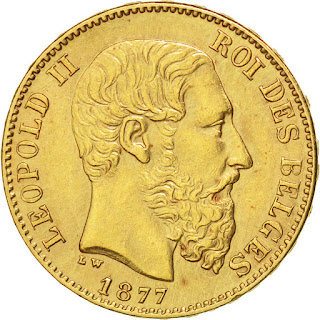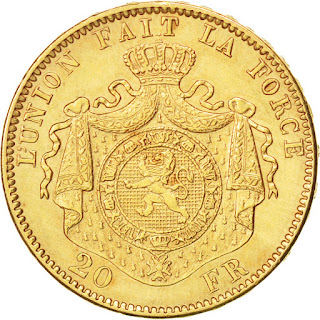Belgium 20 Francs Gold Coin 1877 King Leopold II
Obverse: Bearded head of Leopold II right. Engravers initials (L.W.) below.
Lettering: LEOPOLD II ROI DES BELGES L W 1874.
Engraver: Leopold Wiener.
Reverse: Crowned coat of arms with lion inside order collar.
Lettering: L'UNION FAIT LA FORCE 20 FR.
Lettering: *****DIEU*PROTEGE*LA*BELGIQUE.
Metal: Gold (.900).
Weight: 6.4516 g.
Diameter: 21 mm.
King Leopold II of Belgium
Leopold II (9 April 1835 – 17 December 1909) was the second King of the Belgians, chiefly remembered for the founding and exploitation of the Congo Free State as a private venture. Born in Brussels as the second (but eldest surviving) son of Leopold I and Louise of Orléans, he succeeded his father to the throne on 17 December 1865, reigning for 44 years until his death. This was the longest reign of any Belgian monarch.
Leopold was the founder and sole owner of the Congo Free State, a private project undertaken on his own behalf. He used explorer Henry Morton Stanley to help him lay claim to the Congo, an area now known as the Democratic Republic of the Congo. At the Berlin Conference of 1884–1885, the colonial nations of Europe authorized his claim by committing the Congo Free State to improving the lives of the native inhabitants. From the beginning, however, Leopold essentially ignored these conditions. He ran the Congo using the mercenary Force Publique for his personal enrichment. He used great sums of the money from this exploitation for public and private construction projects in Belgium during this period. He donated the private buildings to the state before his death, to preserve them for Belgium.
Leopold extracted a fortune from the Congo, initially by the collection of ivory, and after a rise in the price of rubber in the 1890s, by forced labour from the natives to harvest and process rubber. Under his regime millions of the Congolese people died; modern estimates range from 2 to 15 million, with a consensus growing around 10 million. Human rights abuses under his regime contributed significantly to these deaths. Reports of deaths and abuse led to a major international scandal in the early 20th century, and Leopold was ultimately forced by the Belgian government to relinquish control of the colony to the civil administration in 1908.

